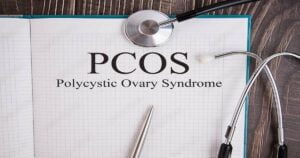Living with Polycystic Ovary Syndrome (PCOS) can be challenging, but understanding the available medications and effective management strategies can empower individuals on their journey to better health. This blog aims to shed light on various PCOS medications, their mechanisms, and how they fit into a holistic approach to managing this common hormonal disorder. Whether you’re exploring treatment options or seeking lifestyle changes to complement medication, this guide will serve as a valuable resource for anyone navigating the complexities of PCOS.
Contents
Should I Consider PCOS Medication?
 Deciding whether to consider PCOS (Polycystic Ovary Syndrome) medication is a personal and nuanced decision that depends on various factors unique to your health and lifestyle. Here are some considerations that may help guide your decision:
Deciding whether to consider PCOS (Polycystic Ovary Syndrome) medication is a personal and nuanced decision that depends on various factors unique to your health and lifestyle. Here are some considerations that may help guide your decision:
- Severity of Symptoms: Evaluate the severity of your PCOS symptoms. If symptoms such as irregular menstrual cycles, hirsutism, acne, or fertility issues significantly impact your quality of life, considering medication may be beneficial.
- Fertility Goals: If you are trying to conceive and experiencing challenges due to PCOS-related fertility issues, medication tailored to improve ovulation may be recommended. Discuss your fertility goals with a healthcare professional to explore appropriate treatment options.
- Impact on Daily Life: Consider how PCOS symptoms affect your daily life, emotional well-being, and relationships. Medication can be a valuable tool for managing symptoms and enhancing overall well-being.
- Health Risks: PCOS is often associated with increased risks of metabolic issues, including insulin resistance, obesity, and cardiovascular complications. Medication may be considered to address these risks and promote long-term health.
- Individualized Treatment Plans: PCOS is a heterogeneous condition, and treatment plans should be tailored to individual needs. Your healthcare provider can help develop a personalized approach that aligns with your health goals and preferences.
It’s important to note that medication is just one aspect of PCOS management. Ultimately, the decision to consider PCOS medication should be made in collaboration with your healthcare team, taking into account your specific circumstances and goals.
What Are Some PCOS Medications to Help?
Several medications are commonly used to manage various aspects of Polycystic Ovary Syndrome (PCOS). It’s important to note that the choice of medication depends on the individual’s specific symptoms and health goals. Here are some commonly prescribed PCOS medications:
Birth Control Pills (Oral Contraceptives)
Birth control pills are commonly prescribed to individuals with PCOS to regulate menstrual cycles and manage hormonal imbalances. These pills contain synthetic hormones, typically a combination of estrogen and progestin, which help regulate the menstrual cycle, reduce androgen levels and alleviate symptoms such as acne and hirsutism. By preventing ovulation, birth control pills can also provide relief from irregular periods. However, it’s important to note that they may not be suitable for those trying to conceive, and various formulations exist.
Anti-Androgens
Anti-androgen medications, such as spironolactone, flutamide, and finasteride, are prescribed to address symptoms associated with elevated androgen levels in PCOS, including acne and hirsutism. These medications work by blocking the effects of androgens on the body’s tissues. Spironolactone, for example, is known for its effectiveness in reducing excess hair growth and improving acne. It’s important to note that anti-androgens are typically not recommended during pregnancy and may require regular monitoring due to potential side effects.
Metformin
 Metformin is commonly used in the management of PCOS, particularly in cases where insulin resistance is a concern. This medication improves insulin sensitivity, helping to regulate blood sugar levels and reduce the risk of metabolic complications associated with PCOS. Metformin may be prescribed alone or in combination with other medications, and its use is often beneficial for individuals with PCOS who have insulin resistance or metabolic concerns. Regular monitoring and adjustments by a healthcare provider are important during metformin treatment.
Metformin is commonly used in the management of PCOS, particularly in cases where insulin resistance is a concern. This medication improves insulin sensitivity, helping to regulate blood sugar levels and reduce the risk of metabolic complications associated with PCOS. Metformin may be prescribed alone or in combination with other medications, and its use is often beneficial for individuals with PCOS who have insulin resistance or metabolic concerns. Regular monitoring and adjustments by a healthcare provider are important during metformin treatment.
Ovulation Inductors
Ovulation-inducing medications, such as clomiphene citrate and letrozole, are often recommended for individuals with PCOS who are trying to conceive. These medications stimulate ovulation by influencing the hormonal signals that control the menstrual cycle. Clomiphene citrate, for instance, is commonly used to induce ovulation in women with irregular cycles. Individuals considering these medications should discuss their fertility goals and concerns with their healthcare team for personalized guidance.
GnRH Agonists
Gonadotropin-releasing hormone (GnRH) agonists, such as leuprolide and goserelin, are medications used in certain cases of PCOS to regulate the menstrual cycle by suppressing ovulation and reducing androgen levels. These medications work by initially causing an increase in certain hormones, leading to a temporary stimulation of the ovaries. However, with continued use, they suppress the production of estrogen and progesterone. Thus, effectively creating a reversible state of ovarian suppression. GnRH agonists are not typically the first-line treatment for PCOS but may be considered in specific situations.
Weight loss Medications
Weight loss medications, such as orlistat, may be considered in individuals with PCOS who are struggling with obesity or excess weight. These medications work by inhibiting the absorption of dietary fat in the intestines, promoting weight loss. Given that obesity is often associated with insulin resistance and exacerbates PCOS symptoms, weight loss can be beneficial in managing the condition. However, the use of weight loss medications should be approached with caution and under the guidance of a healthcare provider.
Fertility Medications
Fertility medications, including gonadotropins like FSH (follicle-stimulating hormone) and LH (luteinizing hormone), are often employed for individuals with PCOS facing challenges with ovulation and fertility. These medications stimulate the ovaries to produce eggs, increasing the likelihood of conception. Clomiphene citrate and letrozole, as mentioned earlier, are also considered fertility medications due to their role in inducing ovulation. Fertility treatments are closely monitored by healthcare providers to optimize the chances of conception while minimizing the risk of complications, such as multiple pregnancies.
It’s crucial to remember that medication should be part of a comprehensive treatment plan that may also include lifestyle modifications, such as a healthy diet, regular exercise, and stress management. The choice of medication and treatment plan should be individualized based on your specific symptoms, health goals, and medical history. Always consult with a healthcare professional for personalized advice and guidance.
Which Pill Is Best For PCOS?
 Choosing the best PCOS medication is a decision that should be made in consultation with a healthcare professional. Because it depends on individual symptoms, health goals, and any underlying health conditions. However, here are some tips to consider when discussing PCOS medication options with your healthcare provider:
Choosing the best PCOS medication is a decision that should be made in consultation with a healthcare professional. Because it depends on individual symptoms, health goals, and any underlying health conditions. However, here are some tips to consider when discussing PCOS medication options with your healthcare provider:
- Understand Your Symptoms
Clearly communicate your PCOS symptoms to your healthcare provider. Whether you’re dealing with irregular periods, acne, hirsutism, or fertility issues, a detailed understanding of your symptoms will help guide the choice of medication.
- Consider Fertility Goals
If you are trying to conceive, your healthcare provider may recommend medications that specifically address ovulation, such as clomiphene citrate or letrozole. Conversely, if pregnancy is not a current goal, hormonal contraceptives may be suggested to regulate menstrual cycles and manage androgen-related symptoms.
- Evaluate Hormonal Balance
Different medications target various aspects of hormonal imbalances associated with PCOS. For instance, birth control pills (combination oral contraceptives) can regulate menstrual cycles and reduce androgen levels, while anti-androgens like spironolactone target symptoms such as acne and hirsutism.
- Consider Metabolic Health
If insulin resistance or metabolic concerns are prevalent, medications like metformin may be considered to improve insulin sensitivity. Managing these aspects of PCOS is essential for long-term health, especially if obesity or diabetes risk is a concern.
- Discuss Lifestyle Factors
Lifestyle modifications, including diet and exercise, are fundamental components of PCOS management. Your healthcare provider may recommend medications that complement these lifestyle changes, aiming for a holistic approach to improve overall well-being.
Remember that there is no one-size-fits-all solution for PCOS. Hence, what works well for one person may not be the best option for another. Open communication with your healthcare provider, a thorough understanding of your health, and a commitment to lifestyle changes will contribute to finding the most suitable medication for your unique situation.
What Are Some Risks Of PCOS Medication To Know?
 While PCOS medications can be effective in managing symptoms and improving quality of life, they may also pose certain risks. It’s crucial to discuss these potential risks with your healthcare provider before starting any medication. Here are some common risks associated with PCOS medications:
While PCOS medications can be effective in managing symptoms and improving quality of life, they may also pose certain risks. It’s crucial to discuss these potential risks with your healthcare provider before starting any medication. Here are some common risks associated with PCOS medications:
- Blood Clot Formation: Some PCOS medications, particularly hormonal contraceptives, may slightly increase the risk of blood clot formation. This risk is generally higher in individuals who smoke or have a history of clotting disorders.
- Insulin Sensitizers and Hypoglycemia: Medications like metformin, which improve insulin sensitivity, may occasionally lead to low blood sugar levels (hypoglycemia). This risk is more likely in individuals with conditions such as diabetes or those taking other medications that affect blood sugar.
- Liver Function: Some medications may affect liver function. Regular monitoring of liver enzymes may be required to ensure that the medication is well-tolerated and not causing adverse effects on the liver.
- Gastrointestinal Issues: Certain PCOS medications, particularly metformin, may be associated with gastrointestinal side effects such as nausea, diarrhea, or abdominal discomfort.
- Mood Changes: Hormonal medications, including oral contraceptives, may, in some cases, affect mood. It’s important to discuss any changes in mood or emotional well-being with your healthcare provider.
- Fertility Medication Risks: Medications used to induce ovulation, such as clomiphene citrate or gonadotropins, may increase the risk of multiple pregnancies (twins, triplets, etc.). Multiple pregnancies carry higher risks for both the mother and the babies, including preterm birth and other complications.
Regular monitoring and follow-up appointments are important to assess how your body responds to the medication and to make any necessary adjustments to the treatment plan. Always inform your healthcare provider of any unusual symptoms or side effects you may experience.
Conclusion
In conclusion, navigating the world of PCOS medication involves thoughtful consideration and collaboration with healthcare professionals. Understanding your unique symptoms, fertility goals, and overall health is key to choosing the most suitable medication. While these medications can effectively manage PCOS symptoms, it’s essential to be aware of potential risks and engage in open communication with your healthcare provider throughout the treatment journey.
Additionally, embracing lifestyle changes, such as maintaining a healthy diet and regular exercise, complements medication and contributes to overall well-being. Remember, you’re not alone in this journey. So, with the right support, a personalized approach to medication, and a focus on holistic health, individuals with PCOS can lead fulfilling and balanced lives. If you are facing PCOS-related issues, PCOS treatment at HerMantra can help. Book your free trial online pcos treatment session now.


